- Home
- Lynne Truss
A Certain Age: Twelve Monologues From the Classic Radio Series Page 7
A Certain Age: Twelve Monologues From the Classic Radio Series Read online
Page 7
I love Saturday mornings. No call centre. No bus. No bleeding grief counsellor! David doing his practice – [Up on David’s cello, then John gently shuts the door on it] That’s lovely, that is. I’m dead proud of him, you know. He’s only been playing a year! A lot of kids would of piled on the agony at a time like this, you know, but not David. Kaff always said, he’s so SANE, David is, it’s a miracle, babe, when you look at the pair of us! Ha. So while David gets on with becoming the next Pablo Casals, like, Saturday’s my chance to clear my head a bit, attack some sorting, change the beds, do the washing, have a sit-down, flip through Kaff’s old Delias. [He turns some pages in a recipe book] Kaff used to love this book. Beats me why. Look at this one. “Wild Mushrooms in Madeira En Croûte with Foaming Hollandaise. This recipe is ideal for entertaining: make the filling and pastry parcels THE DAY BEFORE.” [Can’t cope with this idea] Now, I’m not being funny, but that does my head in. I mean, how can you start making your pastry parcels THE DAY BEFORE, when it’s already the day AFTER the day before? Makes no sense, does it? And I read a bit of Kierkegaard in my time, yeah, I’m not stupid. [Lights fag] I might add this is not the sort of behaviour you would of expected from Delia, either – spreading existential doubt on a nice Saturday morning. [Inhales] No, but I feel proper dynamic on Saturdays. Beds, washing, recipes, advanced philosophical problems, you name it. Oh yeah.
[Pause; he doesn’t move; inhales smoke sharply] The thing is, I can’t tell anybody, but the idea of all those records sort of miniaturised and packed into a stick of chewing gum, I find that quite disturbing, to be honest. I’m not being funny. I know you don’t really get all those tiny classical musicians all sort of squashed in – like “Honey I Shrunk the Berlin Philharmonic conducted by Sir Simon Rattle.” But it’s kind of a worrying idea, that’s what I’m saying. [Smokes] All those cellists in microscopic morning suits, sort of jostling and fighting for elbow room – like, you know, musical spermatozoa. Violinists all cheek-by-jowl and poking each others’ eyes out with their pointy bows. You can imagine ’em, can’t you, all screaming and screaming and suffocating and climbing on top of each other and banging on the walls. Ha. [Smokes and thinks] Don’t bear thinking about, does it?
[Tries to gather himself] Right. Lunch, think about lunch or something – although not wild mushrooms in madeira en croûte with foaming sauce, because apart from not having any wild mushrooms, or madeira, or foam, or in fact anything in the fridge except a tub of Flora, I would of needed to start it yesterday as it turns out, as if I was a psychic or something. [Can’t let this go] I mean, perhaps they should start a new branch of cooking, like, I’m not being funny. The Clairvoyant Kitchen. Psychic Cuisine. Mystic Mince. That could really catch on, that could. You’d get all the ingredients listed, like: eight ounces of flour, cup of sugar, you know, pinch of salt, the usual, and then “Eggs – well, you just GUESS how many eggs, Madame Arcarti, if you know everything else already.”
[Pause; he stubs out the fag] I’m wondering if David’s bed’ll go another week. I’ll ask him, he’s a good kid. [Door opens; the practising can be heard again] No, I won’t disturb him. [As he shuts the door, whispers proudly] You’d never guess what he’s been through, would you?
[Not enthusiastic] So. Beans on toast it is, then. David won’t mind. He can handle anything. “Dad,” David always says, “don’t worry. Beans on toast is great.” And then he does the toast, and puts the kettle on. [Pause] And then he does the beans as well, come to think of it. You know I’m dead impressed by how he’s taken to that cello; he used to be such an outdoor kid, Kaff and I hardly ever saw him. But I suppose everything changed, didn’t it?
You know what? I’ll put the kettle on. Get things started. [An “Uff!” of effort as he leans across to press the kettle switch; it comes to the boil during next bit] The funny thing is, see, I wanted to play the cello when I was his age! I can’t remember what happened to stop me, except – [remembers] well, of course, I asked my dad outright, didn’t I – [it’s hilarious that he was so stupid] I asked me dad! – and ha, that put the kibosh right on it. Ha. I never learned! He was such a nasty bloke, my dad, God rest him! [Laughs] Kaff couldn’t stand him! She was dead angry on my behalf, like, when I told her about him not letting me have a cello. “That was cruel, John! That was so cruel!” The thing is, he was that perverse with us kids when we was small. Sally, she knew how to deal with him, she was clever, and she used to say, John, listen, it’s ever so, ever so easy. You have to pretend you DON’T want something, and then you stand a chance of getting it. See? But if you make a fuss, if you let on it’s important to you, Dad’ll just love not letting you have it! Funny now to remember being a kid. Don’t seem real, all that terror. Like it happened to someone else, in the nineteenth century or something, in a cruel northern orphanage. Once, when little Pete was desperate for a pet, see, Dad found out, so he gave ME a big rabbit, coz he knew I didn’t care one way or the other. That’s how it worked. [Remembers] Ginger! Yeah, Dad gave me Ginger and said I mustn’t share him with little Pete under any circumstances, but I did, and when Dad found out, he was furious and put Ginger in a suitcase and sold him to some geezer up the pub. We were six and four at the time. Pete went mental. But I think Dad done his best, you know, for all that; he just didn’t know what to do with children, except sort of niggle them.
[Kettle has boiled; John spoons instant coffee into cup, adds water etc.] And now David’s taken to the cello, twelve years old, see, so it’s all come right, see. He’s a terrific kid, the way he’s handled everything. He’s been a rock over the past year; an inspiration. And the way he practises all the time – it’s like the opposite of what everyone says: kids moaning on about being made to stay indoors and do their scales and that. I have to tear the thing out of his hands sometimes. Mrs Watson says she’s never seen progress like it! And it’s all self-motivated, that’s the thing, no pressure from me; I hate that, I used to see it when Kaff’s brother was coaching them under-elevens, it was terrible the way them dads pushed the little boys. No, this was all David’s idea. It’s two days after the funeral, I remember, and I’ve just jacked in my manager’s job coz of not coping, and I’ve been locking myself away a bit, like, so as not to frighten the boy, and David says, “Dad, I want to play the cello, can you afford it?”, and I’m proper chuffed and say, well, afford it or not, I’ll arrange the lessons, and he says I’ve already done that, Dad, and all you got to do is pay Mrs Watson in Thames Street, and I say what about an instrument, and he says I got a second-hand one picked out, Dad, so you don’t have to worry about that neither. And since then he’s been at it night and day.
[Dismay] Is that the time? Blimey, right, beans en croûte with can’t-believe-it’s-not-foaming-hollandaise. [Pause] Assuming we got some bread.
Scene Two: the sound of cello practice; he’s not as comfortable as before
All right, how does this thing work? [Fiddles with something mechanical – it’s a quite old-fashioned tape recorder] Allo, allo, allo, testing, testing, one-two, one-two. [Rewind and play: “testing, one-two, one-two”. He stops the machine, and takes a deep breath] I’m not sure about this, at all. But all right. They said, “John, you can always wipe it if there’s something you don’t want us to hear.” So I say, I’m not being funny, mate, but if I wipe everything I don’t want YOU to hear, it’ll be a bloody blank tape. They mean well, I know that. It’s just that they can’t half get on me nerves as well. [Imitates posh person] “It might help DAVID if you do this,” they said. “Have you talked to David? Have you cried yet? If you cry, John, perhaps you can both move forward.” I mean, what’s all that about? I said, [surprised] “David’s all right, thanks, he’s got a cello.” And they look at each other, see, like I’m soft in the head, and I think, well, THAT’S why I don’t say very much, there’s no mystery.
Better shut the door. [Door shuts; cello muffled] Now. [Rustle of paper as he sits down and consults his instructions] I made some notes. [Wry laugh] Ha! Not very helpful. “Tal
k about Kaff.” [Turns paper over] That’s it. Well, look, oh get on with it, John, get on with it.
[Recorder is turned on. From now on, John is recording himself and a bit self-conscious, but is concentrating more than he usually does, rambling less, taking himself a bit more seriously]
All right. [Clears throat] I’m NOT gonna talk about Kaff, actually, I’m going to talk about something else –because, let’s face it, you’re not here and you can’t make me. Ha. And besides, I’m not being funny, but I can’t help noticing that whatever I talk about, you always say, “Ooh, that’s all part of the grieving process, John,” so it occurs to me I could say anything and you’d never act surprised. Say I said, “I’ve developed this taste for salad cream sandwiches with hay in them,” you’d say, “Ah. Hay sandwiches! A recognised stage in the grieving process. Tell us how you feel about hay in general.” Honest, I could really have you on if I felt like it. “I dreamed about being a Shetland pony on a windy beach,” I could say. “I could feel the breeze lift the mane from my neck, and hear the seagulls calling, ‘Kaff! Kaff’.” I mean, that’s just my imagination, see? That’s my trouble, Kaff always said: too much imagination. She didn’t tell me all sorts of things, you know, because she didn’t want me to worry or get obsessed, like. “I know what you’re like,” she’d say. “You’re a Mister Worry Guts, you can’t let things go.” And I know she meant well, but that would really do my head in. We argued about it all the time. She’d say, “John, it’s because I love you that I don’t tell you things.” But I’d say, “If you don’t tell me things, Kaff, you don’t love me!” We never got it sorted, not even at the end. Blimey, I was the last to hear about that tumour being inoperable; her bloody second cousin’s husband knew about it before I did. But anyway, sorry, my point is: say I told you that this pony and seagull dream was true, you’d be going, “Oh that’s good, John, that’s very good. The seagull dream! How did you feel as the pony? Are you ready to cry yet? You see, this is all part of the grieving process!”
Anyway, what I want to talk about, after all that, is my dad. Ha. That surprised you! I was thinking about him the other day, see, and kind of fondly remembering the old bastard, and now I can’t stop thinking about him, and the more I think about him, see, the more upset I get. Well, you did ask. [He is talking calmly] I feel … furious. I’ve never felt this angry in my life, all right? And if you can believe it, it’s over a cello! [Warming] I mean, this was nearly thirty years ago. I hadn’t thought about it for years till the other day. And I don’t even know where I got the idea in those days, it was crackers, kids like me didn’t play musical instruments, and how could he afford it, it was daft. So I keep trying to think of something else, obviously – But if I try and think of something else, see, this fury just wells up and, and, and I want to kill him. IS THIS ALL PART OF THE GRIEVING PROCESS? Coz if it is, you can keep it.
[Big effort; pulls himself together] It’s not the cello, as such. Course it isn’t. I got over that. I just keep thinking, fancy bringing up a kid, training him, like, never to say what he wants, or tell you what’s upset him – always to cover himself up with some sort of camouflage, coz otherwise his own dad will grab the information and use it to hurt him. I mean, I don’t want to blow my own trumpet, but [pride] look at David. Look at the contrast. All right, his mum died. And all right, everyone’s on at me his teachers, the grief people, even Mrs bloody Watson – everyone’s saying this constant cello thing is a bit, you know, funny. They keep asking if Kaff loved that sort of music, and I say, [defensive] “What if she did? There’s nothing morbid about this.” He’s a lucky kid; that’s what they ought to see; I mean, he’s lucky for a start, isn’t he, that I’m not the sort of bloke to break into his room, grab his cello from him and sell it down the Princess Alice! Blimey, I’m even a bit jealous of him sometimes, you know. Jealous of my own kid. Coz, let’s face it: when HE says, out of the blue, “Dad, I’d like a cello,” I get him a cello! [Anger] And there’s nothing FUNNY about David practising. He’s getting on. He’s handling it. He’s coping. If David WASN’T coping – [surprising vehemence] well, just don’t tell me that; don’t anyone ever tell me that; oh stop it, this is stupid! [Grabs machine] How do you stop this thing? [Fumbles with buttons] How do you stop it! [He recovers; deep breath] All right.
[Opens door; cello practice comes in; big sigh of reassurance] That’s better. [Emotional, but not crying] I’m so proud of that boy. I love him so much, you know. I’d bloody die for him. And he loved Kaff so much, oh it would of broke your heart.
Scene Three: the cello is playing faintly; it’s quite early in the morning and John is in bed, just woken up by the sound
What? What, oh no. [Coughs; switches on light] Oh gawd, twenty to seven. [For the first time, he is uncomfortable about the cello; it’s making him feel guilty, so he sounds irritable] I wish he’d knock that off. I know it’s important to the kid, I know that. But, you know, blimey. A laugh’s a laugh.
[A big sigh; he sits up and arranges himself against pillows etc.; coughs, lights up fag] We had a day out yesterday, David and me. It was what you might call an unmitigated disaster. The thing was, Mrs Watson give me a hard time again when I picked David up Tuesday night; she said I ought to spend more quality time with him, see, away from the music. She said it would be an improvement, in fact, if we spent any time together at all. It might help us to “move on”. Everyone’s an expert on me and David, see; everyone’s our unofficial counsellor; that’s what happens when you’re bereaved. [Smokes] It’s not an uninteresting process, I’ll say that. Suddenly, instead of being a viable human being with a job and a family, see, who can be trusted to get on with his own life, you’re just this sort of big emotional blobby thing that people feel they can all take a poke at with a sharp stick. It’s like you got a sign on you: “Come on, give us a poke; if you draw blood, you get a prize.” Like that woman visiting the old lady in the hospice, when Kaff was dying, complete stranger, she took me aside and said, [loud whisper] “You and David will have to be brave for each other now.” And you got to take it, that’s the funny thing. When there’s death going on, you got to say, all grateful, with tears in your eyes, “Do you know, Mrs Doodah, that’s so wise you ought to write it down,” when what you really want to do is punch her in the face, or at least point out that her son is wearing a T-shirt with “Megadeth” printed on it, which is far from tactful in a hospice. She said the same to David, as well, this woman. I heard her. [Whisper] “You’ll have to brave for each other, you and your dad.” Brave for each other? Of course we’re brave for each other, silly cow. We know that much, thank you, we’re not stupid.
Took me a little while to come up with a scheme for a day out, though, coz I didn’t want David to smell a rat, like. I mean, if I said, all casual, “Son, how about a bit of a knockabout down the park?” he’d of thought, now, that’s a bit odd, Dad bloody hates football and so do I. And there was lots of things I couldn’t suggest coz they’d of reminded him of his mum. Then I remembered how he’d always fancied a go on that London Eye, you know, and I thought, well, I COULD handle that, it’s only half an hour, I don’t have to spend the whole time on it picturing, you know, a fatal catastrophe. There’s no need to dwell on the way it might break off its spindle, like, and then with this terrible roaring, trumpeting noise like a dying elephant, roll along the river-bed of the Thames and crash into Waterloo Bridge all buckled like a wrecked bicycle wheel. And meanwhile all the people in the glass bubbles getting thrown about like grains of sand in an egg-timer and suffocating and dying under water and ending up as the first item on the Six O’Clock News.
The thing about David is that he looks ever so much like his mum, have I said that? Light-blue eyes, all alive and watchful. And when he laughs – oh blimey, when he laughs he’s the spitting image. And he’s dead quick like she was. “You’re not going to worry about this, Dad?” he said as we stepped into the gondola thing. [Brave laugh] “Course not,” I said. “Course not. Come on, David, this’l
l be lovely.” Then the door closed on the little group we were destined to share our lovely watery grave with, and we started to rise up in the air, swinging a bit, and I shut my eyes and thought about how, if I sorted out the room with the records in it, we could set up that old ping-pong table Kaff’s mum give us; and then I thought how strange it was that David don’t play computer games like other kids and is it my fault, I bet it’s my fault for not encouraging him or asking other kids round to play, but when does encouragement become interference, and when does interference become bullying, and would I be a better dad if I sat him down and said, “TALK to me about your mum, David,” but on the other hand what kid wants a ping-pong table these days, you must be crackers, John, and when I opened my eyes we’d only travelled about a foot into the air and I thought, mm, this is going to be a test, then.

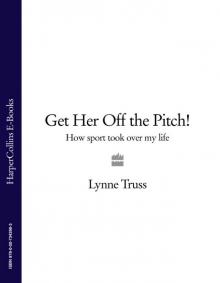 Get Her Off the Pitch! How Sport Took Over My Life
Get Her Off the Pitch! How Sport Took Over My Life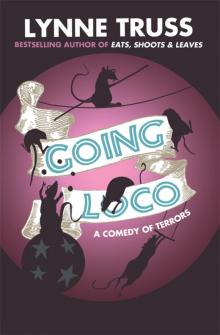 Going Loco
Going Loco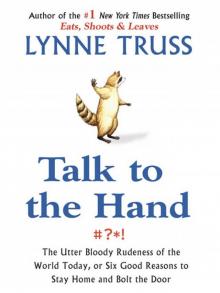 Talk to the Hand
Talk to the Hand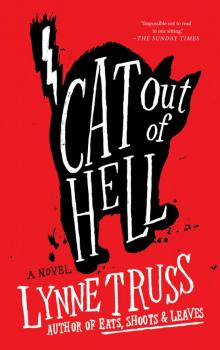 Cat Out of Hell
Cat Out of Hell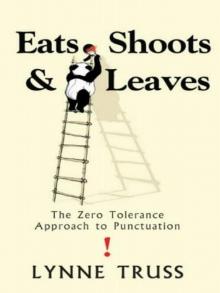 Eats, Shoots and Leaves
Eats, Shoots and Leaves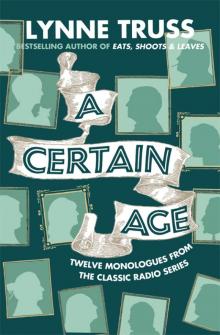 A Certain Age: Twelve Monologues From the Classic Radio Series
A Certain Age: Twelve Monologues From the Classic Radio Series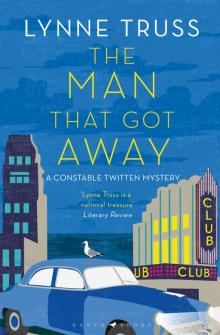 The Man That Got Away
The Man That Got Away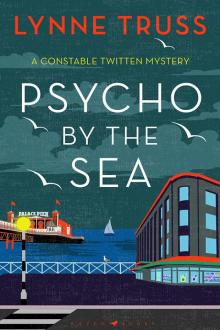 Psycho by the Sea
Psycho by the Sea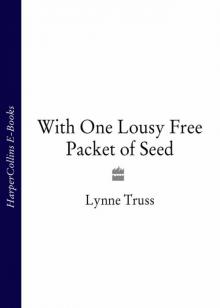 With One Lousy Free Packet of Seed
With One Lousy Free Packet of Seed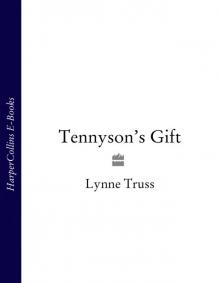 Tennyson's Gift: Stories From the Lynne Truss Omnibus, Book 2
Tennyson's Gift: Stories From the Lynne Truss Omnibus, Book 2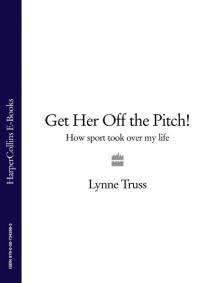 Get Her Off the Pitch!
Get Her Off the Pitch!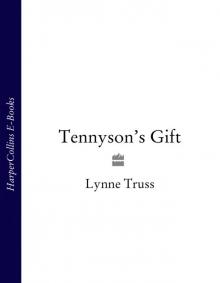 Tennyson's Gift
Tennyson's Gift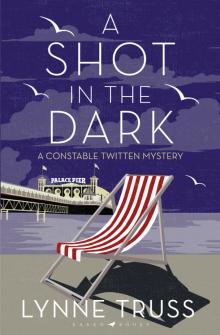 A Shot in the Dark
A Shot in the Dark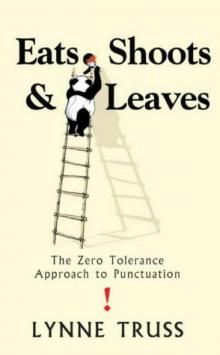 Eats, Shoots and Leaves: The Zero Tolerance Approach to Punctuation
Eats, Shoots and Leaves: The Zero Tolerance Approach to Punctuation